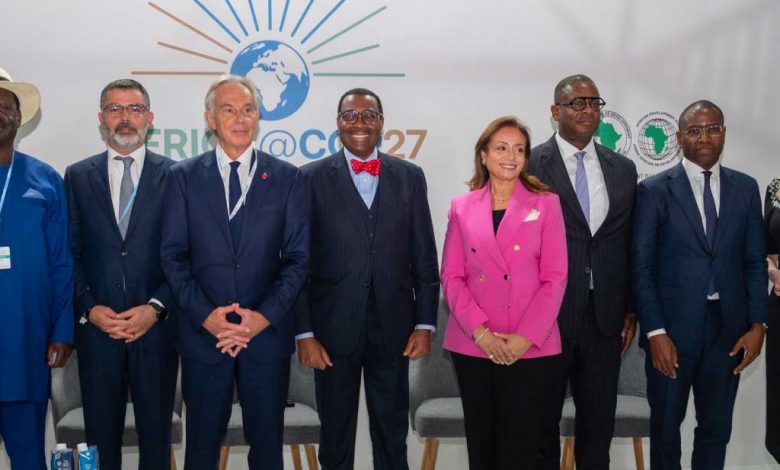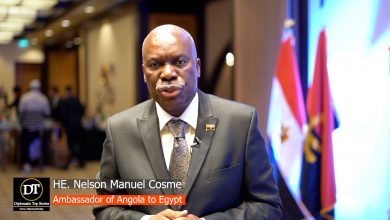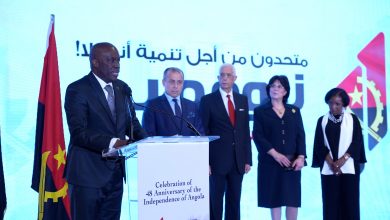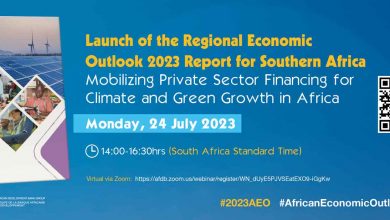COP27: African and Global Partners Launch Multi-Billion Green Infrastructure Alliance | African Development Bank

Diplomat.Today
The African Development Bank
2022-11-11 00:00:00
——————————————-
The African Union, the African Development Bank Group and Africa50 – in collaboration with several global partners – have launched the Alliance for Green Infrastructure in Africa (AGIA), an initiative to scale up and accelerate financing of green infrastructure projects in Africa.
The collaborating global partners working with the African Union, the African Development Bank and Africa50 are the African Union Development Agency, the European Investment Bank, the European Bank for Reconstruction and Development, the French Development Agency, the Rockefeller Foundation, the US Trade and Development Agency , the Global Center on Adaptation, the Private Infrastructure Development Group and the African Sovereign Investors Forum.
The launch ceremony took place on Wednesday on the sidelines of the ongoing 27e annual global climate summit (COP27) in Sharm El-Sheikh, Egypt.
The Alliance’s mission is to raise significant capital to accelerate Africa’s just and equitable transition to Net Zero emissions. It has two strategic objectives. The first is generating a robust pipeline of transformational bankable projects. The second is to catalyze financing at scale and speed for Africa’s infrastructure.
Following the announcement of the Alliance at the 6th European Union-African Union Summit in Brussels in February this year, the partners began their collaboration and identified four pillars for collective action:
Project preparation and development – This pillar supports the transformation of projects from concept to bankable proposals. It is also developing a strong pipeline of bankable green infrastructure projects.
Project reviews – This pillar establishes green eligibility criteria and project assessment guidelines for infrastructure projects. It also provides technical assistance to build capacity within the public sector.
Cofinancing and De-risking – This pillar provides the required risk reduction tools to facilitate investment and develop a clear framework to mobilize equity and debt financing for green infrastructure from AGIA members and other sources.
Institutional investors – The Institutional Investors pillar facilitates the mobilization of funds from global and African institutional investors and leverages African and international capital markets to drive green bond issuance and project financing.
The Alliance for Green Infrastructure in Africa will raise up to $500 million to provide early stage project development capital. This is capital that will build a robust pipeline of bankable projects, starting with the pre-feasibility stage through to commercial and financial close. This is expected to generate up to $10 billion in green infrastructure investments. This will be mobilized from a combination of co-investment, co-financing, risk mitigation and blended funding by Alliance members. This capital will also come from other financial institutions and foundations, public and private global and African institutional investors, project sponsors, sovereign operations of multilateral development banks and from G-20 bilateral donors.
The Alliance’s focus sectors are energy, transportation, water and sanitation, health infrastructure, broadband infrastructure, urban and rural infrastructure. It will support large-scale programs such as mega solar projects or green hydrogen projects, as well as smaller venture capital initiatives such as cleantech projects, energy storage or e-mobility solutions.
In opening remarks, Dr. Akinwumi Adesina, President of the African Development Bank Group said: “The AGIA platform is a new platform fully aligned with the global call of the G7 leaders in June this year when they called for the partnership for global infrastructure and investment . to mobilize $600 billion in infrastructure by 2027, in particular to support sustainable, high-performance and climate-resilient infrastructure.”
Adesina added: “We need all of you as the needs in Africa are simply huge. Only by working together and pooling our resources can we have a transformative impact and put Africa on a clear path to achieving NetZero emissions and mitigating climate change. Africa needs infrastructure funding, estimated at between $130 billion and $170 billion per year, with an infrastructure funding gap of up to $108 billion per year.
“But most of the infrastructure for Africa has yet to be built. This presents a huge opportunity to get it right. Build green infrastructure that is climate-smart and climate-proof.”
Dr. Amani Abou-Zeid, African Union Commissioner for Energy and Infrastructure, said: “As African institutions, we need to focus on preparing projects at an early stage, de-risking interventions and building a robust business environment to attract investors from from all parts of the world. . We want to commit to priority projects that combine all our efforts to deliver. We now need to intensify our efforts and act faster and on a larger scale.”
Africa50 CEO Alain Ebobissé said: “I am excited about AGIA’s mandate. It is a result-oriented initiative that quickly scales up projects from the concept phase to financeability. I look forward to working with more development institutions and private sector players in Africa and globally to leverage additional resources so that we can deploy the $10 billion we have set as a target for AGIA’s green, sustainable infrastructure investments.
The ceremony, held at the COP27 Africa Pavilion, brought together world leaders, heads of development finance institutions and private sector business representatives. It included a panel discussion on the theme “Alliance for Green Infrastructure in Africa: A Path Forward for African Countries to Accelerate Their Transition to Net-Zero.”
The panel included Dr. Amani Abou-Zeid, African Union Commissioner; Africa50 CEO Alain Ebobissé; Ithmar Capital CEO and Chairman of the Africa Sovereign Investors Forum Obaid Amrane; Global Center on Adaptation CEO Patrick Verkooijen; President of the Rockefeller Foundation Dr. Rajiv J. Shah; Ambroise Fayolle, Vice President of the European Investment Bank, and former UK Prime Minister, The Right Honorable Tony Blair.
Ambroise Fayolle, Vice President of the European Investment Bank, commented: “Project preparation and access to finance are among the main barriers to making Africa’s infrastructure green and climate-resilient. Today’s announcement of the Alliance for Green Infrastructure in Africa marks an important milestone to accelerate and scale funding from public and private sources. The EIB is delighted to join the Alliance and work closely with the African Union, the African Development Bank, Africa50 and partners to make this new initiative a success.”
Rajiv Shah of the Rockefeller Foundation said: “Africa is on the frontline of the global climate, energy and food crises, but has contributed the least to these crises. The continent is only responsible for about 3% of historical greenhouse gas emissions. With innovative initiatives such as the Alliance for Green Infrastructure in Africa. The people of Africa can lead a clean energy revolution that averts climate catastrophe and expands the reach of electricity access and economic opportunity across the continent.”
Obaid Amrane of Ithmar Capital said: “AGIA is here to bring some solutions. I am convinced that we can green Africa, both in electricity generation and by helping Europe green its industry. It is also an opportunity to create jobs for young people.”
Ambroise Fayolle from the European Investment Bank said: “What we like about this initiative is that it touches on two things that are of the utmost importance: the ability to boost project preparation and bring in private capital. We are happy to bring the capital needed to make these projects a success. Climate is a top priority for the EIB and the European Union. Our mandate is to ensure that we support green projects in Africa. Africa is already almost half of our portfolio. The pragmatic approach of this alliance makes me optimistic. We need to bring things that are replicable and that we can replicate in projects in different parts of Africa. It’s about whether we can deliver quickly.”
In his closing remarks, Tony Blair said: “We are only going to solve this problem by taking strong measures based on practical planning and implementation. It is important that governments grow sustainably. The question is not just how do we manage to get the funding and investment in Africa, but also how governments prepare to absorb that funding and that’s the other side of the equation, which is why project preparation is so important.
“It is always a partnership. I don’t think the problem is a lack of will or appetite on the part of the African people or their governments. It’s a matter of organization, of getting the right elements in place to make the vision a reality. And if I’ve learned anything in government, it’s that the hardest part is getting things done. We can write the reports and have the great visions. But in the end it’s all about the execution.”
COP27, commonly referred to as the African COP, is an opportunity to highlight the special needs, circumstances and opportunities of the African continent. The African Development Bank, together with the African Union Commission, the United Nations Economic Commission for Africa and the African Union Development Agency, will host an Africa pavilion at the conference.
The Africa Pavilion provides a space for Africa to meet and strategize to defend its common positions and interests at COP27. nature-based solutions, adaptation finance and loss and damage.
——————————————-



